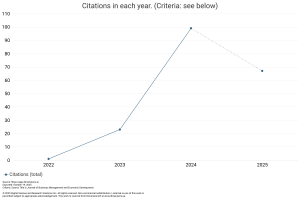Effect of Work Motivation and Reward on Job Satisfaction Online Gojek Driver in Banjarmasin, Indonesia
DOI:
https://doi.org/10.59653/jbmed.v1i03.195Keywords:
Job Satisfaction, Online Gojek Driver, Reward, MotivationAbstract
This study aims to examine the effect of work motivation and reward variables on job satisfaction variables for Gojek online drivers in the city of Banjarmasin, Indonesia. The design of this research is research with quantitative methods and is afield survey research by taking primary data sources. The research population is Gojek Online drivers in the city of Banjarmasin and a sample of 30 respondents using a purposive sampling method. The data was processed by analyzing multiple linear regression data with the help of the SPSS test tool. The statistical test results and the results of the hypothesis in this study conclude that the work motivation variable and the reward variable simultaneously have a positive and significant effect on the online Gojek driver job satisfaction variable in Banjarmasin City, while the partial test results for the work motivation variable do not have a significant effect on the job satisfaction variable. Online Gojek drivers in Banjarmasin City, and the reward variable partially has a positive and significant effect on the J variable ob Satisfaction Gojek Online Drivers in Banjarmasin City, this research only takes objects in Banjarmasin city, it is hoped that further research can expand objects in other cities in Indonesia.
Downloads
References
Afandi, P. (2018). Manajemen Sumberdaya Manusia Teori Konsep dan Indikator. Zanafa Publishing.
Ajabar. (2020). Manajemen Sumber Daya Manusia. Grup Penerbit CV Budi Utama. Astuti, D. G. M., & Mayasari, N. M. D. A. (2021). Pengaruh Beban Kerja Dan Motivasi Kerja Terhadap Kepuasan Kerja Pegawai Pada Lapas Kelas Iib Singaraja. Bisma: Jurnal Manajemen, 7(2), 255–263.
Bahri, S., & Nisa, C. N. (2017). Pengaruh Pengembangan Karir dan Motivasi Kerja Terhadap Kepuasan Kerja Karyawan. Jurnal Ilmiah Manajemen & Bisnis, 9–15.
Fahmi, I. (2016). Manajemen Sumber Daya Manusia Teori dan Aplikasi. Alfabeta.
Ferdinand, A. (2014). Metode Penelitian Manajemen (5th ed.). Badan Penerbit Universitas Diponegoro.
Fitria, J., & Sawitri, H. S. R. (2017). Pengaruh Reward, Insentif, Pembagian Tugas Dan Pengembangan Karier Pada Kepuasan Kerja Perawat Di Rumah Sakit Ortopedi Prof. Dr.R. Soeharso Surakarta. Jurnal Manajemen Dan Bisnis, 2(1), 28–44.
Foenay, E. E., Fanggidae, R. E., & Ndoen, W. M. (2020). Pengaruh Reward Terhadap Kepuasan Kerja Karyawan Di Pdam Tirta Lontar Kabupaten Kupang. Journal Of Management (SME’s), 11(1), 83–97.
Ghozali, I. (2011). Aplikasi Analisis Multivariate Dengan Program IBM SPSS19. Badan Penerbit Universitas Diponegoro.
Ghozali, I. (2018). Aplikasi Analisis Multivariate Dengan Program IBM SPSS 25 (9th ed.). Universitas Diponegoro.62
Hasibuan, M. S. (2014). Manajemen Sumber Daya Manusia. Bumi Aksara.
Hootsuite (We are Social). (2023). Indonesian Digital Report 2022. website: https://andi.link/hootsuite-we-are-social-indonesian-digital-report-2023/
Muslih, M., & Zamara, N. (2022). Pengaruh Disiplin dan Motivasi Kerja Terhadap Kinerja Karyawan dengan Kepuasan Kerja Sebagai Variabel Intervening. Jurnal Ekonomi, Manajemen, Akuntansi, Bisnis Digital Dan Kewirausahaan, 1(4), 353–371. https://doi.org/10.55983/inov.v1i4.244
Muslim, S. R., & Puspitasari, D. (2023). Pengaruh Kepemimpinan, Motivasi dan Sistem Penghargaan Terhadap Kepuasan Kerja di Masa Pandemi Covid 19 (Studi Kasus pada Karyawan PT. Sejahtera Sunindo Trada Semarang). Jurnal EK&BI, 6, 2620–7443. https://doi.org/10.37600/ekbi.v6i1.841
Narwathi, N. M. D., Trarintya, M. A. P., & Astawa, I. P. (2023). Pengaruh Lingkungan Kerja dan Motivasi Kerja Terhadap Kepuasan Kerja Karyawan. Jurnal Manajemen, Kewirausahaan Dan Pariwisata, 3(6), 1033–1044.
Purboyo, P., Lamsah, L., Zulfikar, R., & Wahyuni, A. (2022). How Environment Knowledge, Social Influences, and Attitude Impact The Millenial Generation’s Purchase Intention in Green Products Through Attitude?. International Journal of Science, Technology & Management, 3(4), 1184-1194.
Robbins, S., & Judge, T. (2015). Perilaku Organisasi Edisi 16. Salemba Empat.
Robbins, S. P., & Judge, T. A. (2018). Perlaku Organisasi (7th ed.). Salemba Empat.
Sastrohadiwiryo, B. S. (2010). Manajemen Tenaga Kerja Indonesia. Bumi Aksara.
Sekaran, U., & Bougie, R. (2017). Metode Penelitian Untuk Bisnis : Pendekatan Pengembangan Keahlian (6th ed.). Salemba Empat.
Sugiyono. (2016). Metode penelitian kuantitatif, kualitatif dan R&D. Alfabeta. 63
Wijaya, F. L. (2021). Sistem Reward dan Punishment sebagai Pemicu dalam Meningkatkan Kinerja Karyawan. Jurnal Ilmu Komputer, Ekonomi Dan Manajemen (JIKEM), 1(2), 1–11ul Martapura. Jurnal Manajemen dan Kewirausahaan, 21(1), 44-52.
Zulfikar, R., & Vitria, A. (2021). Examine The Behavior Of Private Universities Lecturer In Respecting Kampus Merdeka Policies Using Theory Of Planned Behavioral Approach. International Journal Of Economics, Management, Business, And Social Science (IJEMBIS), 1(3), 255-266.
Downloads
Published
How to Cite
Issue
Section
License
Copyright (c) 2023 Dini Erviani, Husnurrofiq Husnurrofiq, Purboyo Purboyo

This work is licensed under a Creative Commons Attribution-ShareAlike 4.0 International License.
Authors who publish with this journal agree to the following terms:
- Authors retain copyright and grant the journal right of first publication with the work simultaneously licensed under a Creative Commons Attribution-ShareAlike that allows others to share the work with an acknowledgement of the work's authorship and initial publication in this journal.
- Authors are able to enter into separate, additional contractual arrangements for the non-exclusive distribution of the journal's published version of the work (e.g., post it to an institutional repository or publish it in a book), with an acknowledgement of its initial publication in this journal.
- Authors are permitted and encouraged to post their work online (e.g., in institutional repositories or on their website) prior to and during the submission process, as it can lead to productive exchanges, as well as earlier and greater citation of published work (See The Effect of Open Access).





























